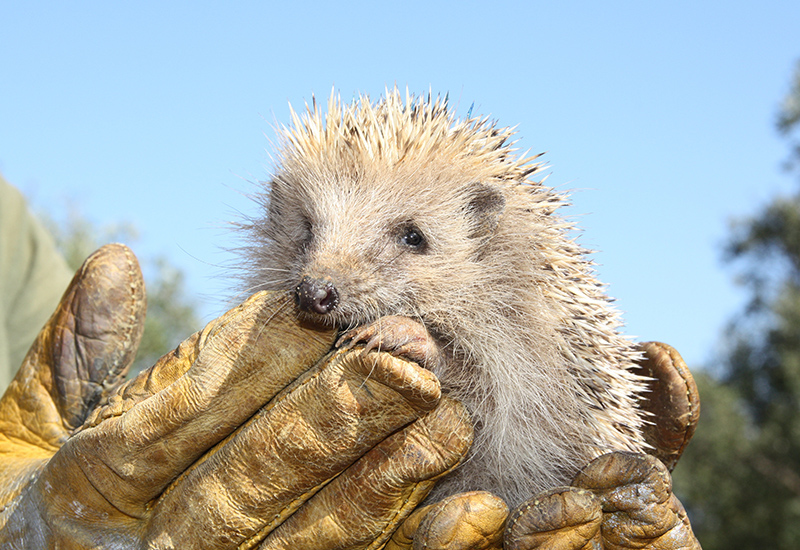One of my favourite wild animals that we see in the Algarve is the European Hedgehog (Erinaceus europaeus).
WORDS Luis Teves Costa
Small in size, with a round-shaped body and adorable snout, these creatures roam freely in most of Portugal. Throughout the Algarve, they are abundant. They can grow up to 25cm in length and weigh over 1kg. Their bodies are covered in keratin spines that share the same structural base protein found in human hair and nails. Usually solitary animals, they seek a partner during mating season, which happens from spring to late summer. At this time, males will also fight between themselves to establish dominance. Females usually have one or two litters per year – they will give birth and care for three to six hoglets each time.
Originally called Urchins (a name that still persists in Portuguese – Ouriço), in English their name eventually changed to reflect their hedge-dwelling habits. When threatened, this mammal will curl up into its trademark defence mechanism, which is basically one big spiky ball. Once the danger is gone and they feel safe, they will relax their bodies back to their normal appearance.

Hedgehog – Photo By Jeff Godden
Hedgehogs have inspired many artists and toy-makers around the globe to create their original versions of this animal. The British author Beatrix Potter has left us with the magical tale of Mrs. Tiggy-Winkle, first published in 1905. More recently, during the 1990s, Sega presented us with Sonic & his friends on gaming adventures, and toy companies have produced numerous designs that appeal to kids of all ages.
There are 17 reported species of hedgehogs worldwide and they all share the same spiny appearance and relatively small size. Some species have quite obvious distinct characteristics, such as the long-eared hedgehog or the four-toed hedgehog. Hedgehogs live in forests, grasslands, deserts and wooded areas throughout most of the African continent, Europe and Asia.

In Portugal, you can only find one species in the wild – the European or Common Hedgehog. Back in the day, hedgehogs could be sold in pet shops around Europe, including the famous pet department at Harrods in London. Today they are protected as wild animals and it is illegal to keep them as pets.
For those who own a piece of land or a garden (without dogs or cats), you can encourage hedgehogs to stay. This is the closest you will get to having a pet hedgehog. Leave some water out and allow access in and out of your garden as many modern fences are impenetrable for most land animals. Remember, “hedgehogs are a gardener’s best friend as they feed on slugs and snails and pretty much everything that eats your plants and flowers. Omnivorous mammals, they will feed on a wide variety of food sources such as insects, worms, mushrooms, eggs or fruits. Feeding hedgehogs is not advisable as it will suppress their natural instinct for hunting and foraging, and it will also mean that they will not be targeting the insects and worms on your land. Hedgehogs are also naturally lactose intolerant so never put milk out for a hedgehog.
Pick a covered hidden spot in a hedge or bush and place a wooden box or nest. If they feel safe around your house and neighbourhood, they may just accept your accommodation, even if only temporarily, as these nomadic animals can walk around 2km a day and even swim across water.
Some people have been known to install night security cameras in their garden so that they can check the nocturnal activity the next day. This technology allows you to spot hedgehogs on their nocturnal errands and other visitors, such as foxes, badgers or the elusive yet common genet.
Hedgehogs do hibernate but some occurrences may interfere with their sleeping plans. If they have not fed enough to hibernate, they will continue to forage through the winter. In the Algarve, the warm weather and availability of food sources mean that they do not feel the need to hibernate or might just do so during the two or three months of our mild winters.
For a more charitable approach, you can also adopt a hedgehog in the Algarve. RIAS – a wildlife rescue and recovery centre based in Olhão – offers a chance to adopt a rescued hedgehog. This one-off sponsorship comes with a certificate, species information card, invitation to participate in hedgehog releases back to the wild and other perks.
RIAS take in injured or malnourished hedgehogs (and all other non-exotic wild animals) on a regular basis. Over 600 hedgehogs have been admitted at RIAS since 2010. Many of these have been successfully released back to mother Nature. The most common causes for rescuing are: orphaned hoglets, road accidents, injuries from wild animals or domestic cats and dogs, malnutrition and poisoning.
During Autumn, bonfires also pose a very dangerous trap. The wooden piles are very appealing to hedgehogs at a time of the year when they are on the lookout for a cosy shelter and considering hibernation. Please remember to check for hedgehogs before lighting your bonfire!
Adopt a Hedgehog: rias-aldeia.blogspot.com/p/apadrinhamento_12.html
If you find a hedgehog in need of help contact RIAS: +351 927 659 313
Help RIAS’ work! Make a donation:
IBAN PT50 0035 0555 0004 8770 8302 8 / BIC SWIFT CGDIPTPL
(RIAS is part of a non-profit association ALDEIAS)
Main image: Hedgehog recovery – Photo by RIAS













